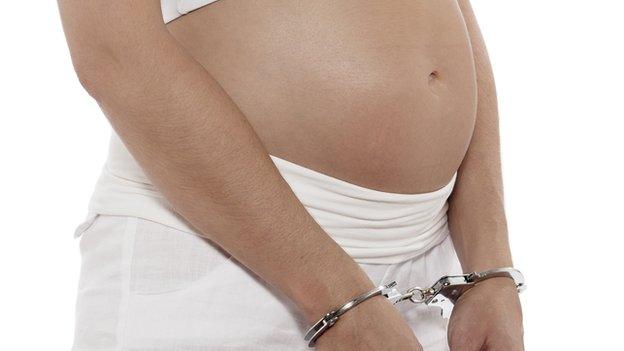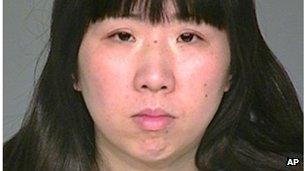Do pregnant women have different rights?
- Published

A pregnant women's group claims that criminal action against expectant mothers is on the rise. Is the US going too far in trying to protect foetal rights?
When Bei Bei Shuai was eight-months pregnant, her boyfriend - the child's father - ended their relationship.
Distraught, Shuai - who worked at a Chinese restaurant in Indianapolis, Indiana - took rat poison in an attempt to end her life.
According to court documents, Shuai left a note addressed to the boyfriend, in which she declared that she was going to kill herself, and in doing so, she was "taking this baby, the one you named Crystal, with me".
That note is the basis of a criminal case against Shuai, who survived her suicide attempt and went on to deliver the baby - only to have the child die four days later. As a result, Shuai is charged with murder and attempted foeticide.
This is the first such case in Indiana.
The state recently passed a law which prohibits terminating a pregnancy through anything other than a legal abortion.
Furthermore, the state's murder statute has a subsection that specifically says the intentional killing of a foetus is murder.
"The legislature has mandated that a foetus has a status separate and distinct of the mother, and our obligation is to apply the law," says Terry Curry, the county prosecutor handling Shuai's case.
That Shuai left a note signifying her intention to kill the foetus as well as herself, he says, makes it clear that she violated the new law.
But not everyone thinks the charges are just.
"The law for 200 years has been to protect pregnant women, not prosecute them," says Linda Pence, Shuai's lawyer.
She says that it's not likely that the rat poison killed Shuai's baby, and that charging Shuai for attempting to kill herself denies her the rights of most citizens.
"Under their interpretation, everyone in the state can kill themselves except pregnant women, who then face some of the most restrictive statues in the book," she says.

Bei Bei Shaui
Indiana courts have rejected Pence's claim that Shuai has been denied equal protection under the law. But they have excluded the coroner's testimony that the rat poison caused the baby's death.
As a result, Curry has said he may have to drop the murder charge, external.
Women's advocates say pregnant women are increasingly the target for criminal charges and forced medical interventions.
The National Advocates for Pregnant Women (NAPW) published a study this month , externaldocumenting more than 400 cases of both criminal action against pregnant women and forced medical interventions - in which court orders or police action required women to undergo procedures like blood transfusions or caesarean sections against their will - between 1973 and 2005.
"From 2005 until today, without engaging in anything like the level of research we engaged in during that study, we already know of 250 cases," says Lynn Paltrow, author of the report and NAPW's executive director.
"They are happening every day."
She says an increased focus on the health of an unborn child has stripped pregnant women of their rights.
"You're not just denying women their reproductive rights, you're denying them the most fundamental aspects of due process of law," she says, noting that cases of medical intervention are often considered "emergency" ones, where women are not given the time to consult with legal counsel or present evidence on their behalf.
"Everyone feels like they are an expert on pregnant women," she says. "People feel that they are entitled to judge women when they become pregnant."
Moreover, she says, "foetal homicide" laws now on the books in 38 states, external put the rights of the unborn above those of pregnant women. These laws provide harsher punishments or additional murder counts for those whose actions result in the death of a foetus.
"The foetal versus mother's rights are always going to be an issue," says David LaBahn, president and chief executive of the Association of Prosecuting Attorneys.
He notes that while these laws are often championed after a pregnant woman has been the victim of violence, they take on new life after passage.
"It is the outside attacks that create the basis for the law, but then that raises the abortion concern and causes the right-to-life versus the pro-life fight," he said.
To Terry Curry, the prosecutor in Indiana, Shuai's case isn't part of a troubling trend - it's an individual crime that requires prosecution.
"We heard literally such ridiculous assertions that we're going to have police monitoring women's pregnancies, this is a slippery slope, that we are going to prosecute women who abuse drugs or alcohol during pregnancy," he says.
"The courts have already determined that sort of reckless behaviour doesn't constitute a crime. What distinguishes this case is her specific stated attempt" to kill the foetus along with herself when she was 33-weeks pregnant.
Her lawyer, however, says her client is receiving the wrong kind of attention. "The fact that a woman was so desperate to end her own life by consuming rat poisoning is tragic," says Pence.
"She should be taken care of and protected. In no way should she have been prosecuted, period."
Shuai is scheduled to go on trial in April.